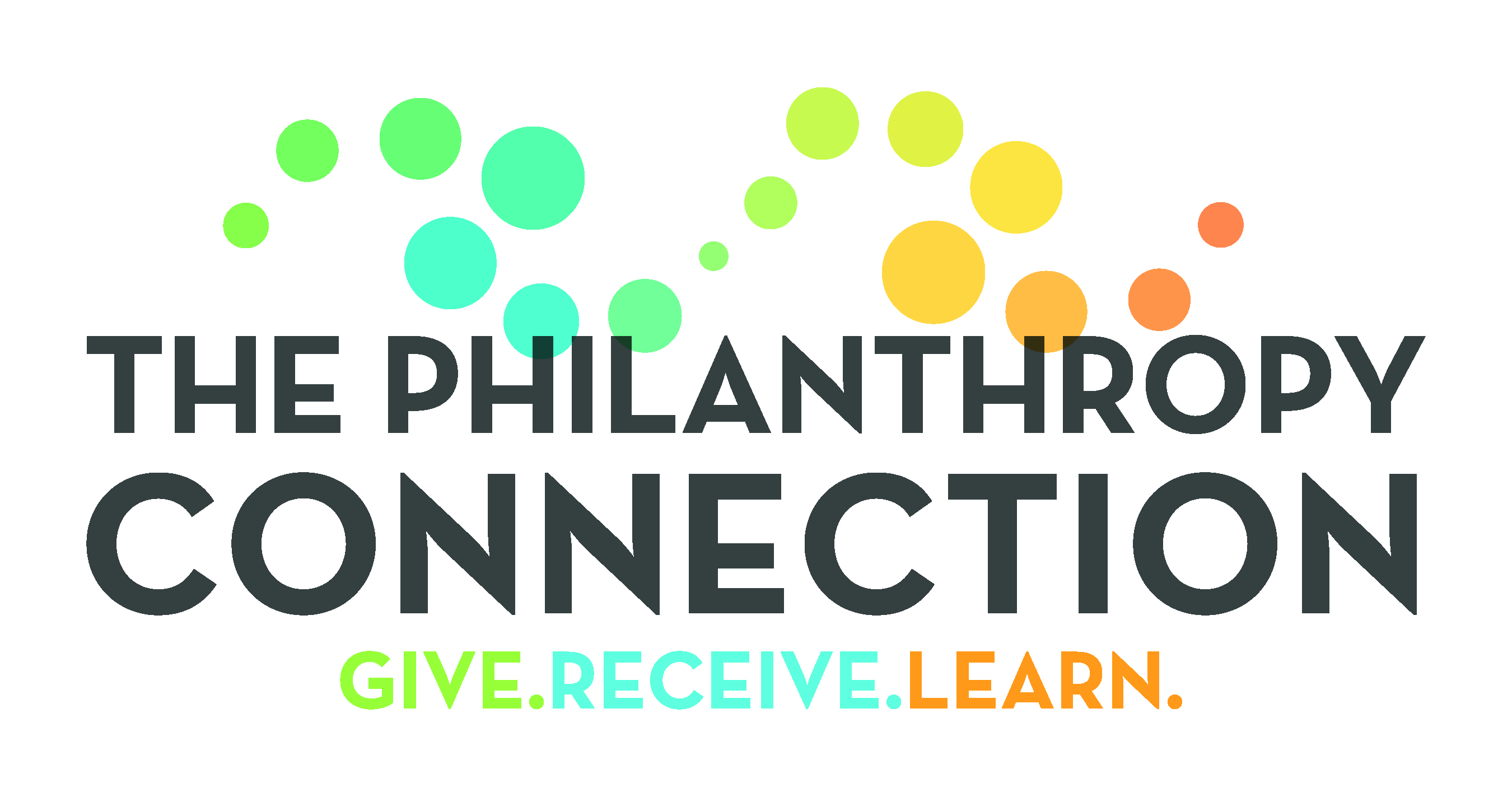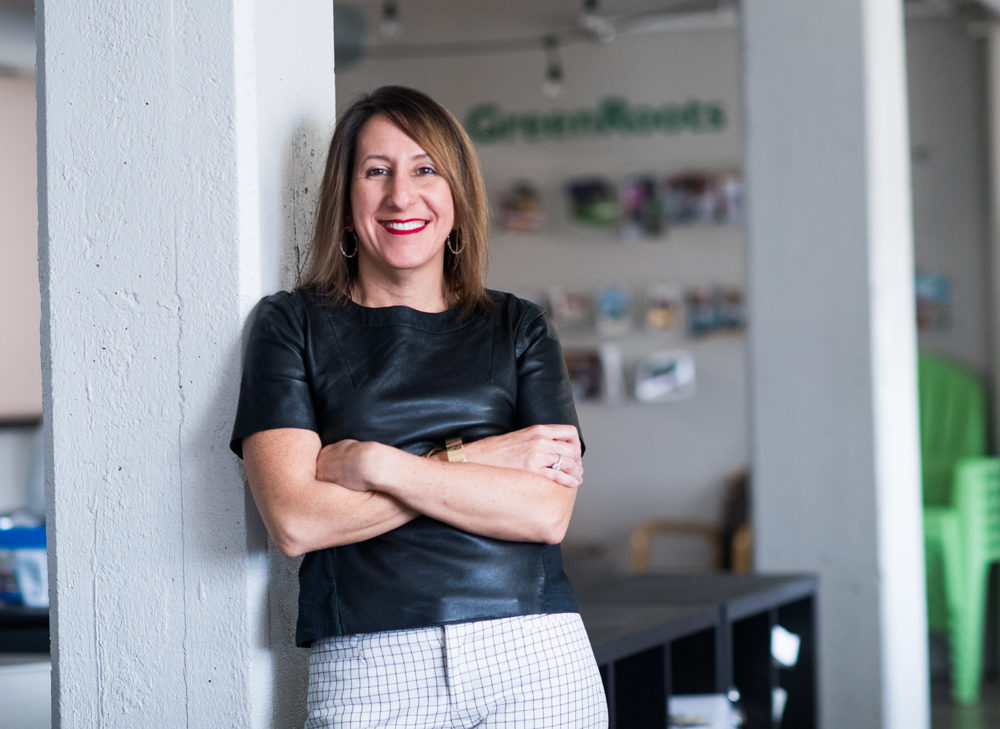Interview with Roseann Bongiovanni, Executive Director
Tell us a little about yourself and how you came to GreenRoots.
I am a lifelong Chelsea resident and a former city councilor. I began doing community work at the age of 18, when I graduated from Chelsea High School and was beginning college at Boston University. Looking for a way to stay connected to Chelsea, I applied for a job as a community organizer with what was then called the Chelsea Green Space and Recreation Committee. That position began a life’s commitment to environmental, economic, and social justice.
How has the work changed over the years?
Initially, our main objectives were to ensure the city was meeting its commitment to give back park space taken for the construction of new schools; to open the new schools to our residents through “community schools,” and to ensure other city parks, which became very heavily utilized, were well maintained. (Community schools are partnerships between schools and community services. The overarching goal of these partnerships is to have an integrated focus on academics, health and social services, youth and community development, and community engagement that leads to improved student learning, stronger families, and healthier communities.)
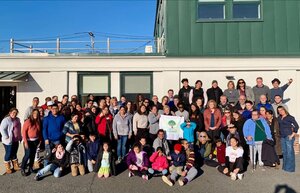 Those early days weren’t very exciting. But then, something changed. We began focusing on the quality of life and environmental health risks posed by the oil tanks and industries lining the Chelsea Creek waterfront. The game changer was when we started to realize that industry, rather than people, had access to our waterfront. Our neighborhoods were being impacted by significant air, land, water, and noise pollution, and, as a result, had some of the worst health statistics in the state.
Those early days weren’t very exciting. But then, something changed. We began focusing on the quality of life and environmental health risks posed by the oil tanks and industries lining the Chelsea Creek waterfront. The game changer was when we started to realize that industry, rather than people, had access to our waterfront. Our neighborhoods were being impacted by significant air, land, water, and noise pollution, and, as a result, had some of the worst health statistics in the state.
It became clear that Chelsea was a prime example of environmental injustice – when low-income communities and communities of color are disproportionately burdened by toxic facilities and industrial and environmental contamination. This is when my “job” transformed into a life’s passion. Since that time, GreenRoots has fought and won some of the most profound environmental justice victories in the state, including preventing the construction of a dirty diesel power plant and the transportation of mile-long ethanol freight trains through our city to an oil terminal on Chelsea Creek. We’ve transformed blighted spaces, removed tons of air pollutants, and built a movement of engaged community members who are fighting to make our city, and cities like ours, healthier and more just.
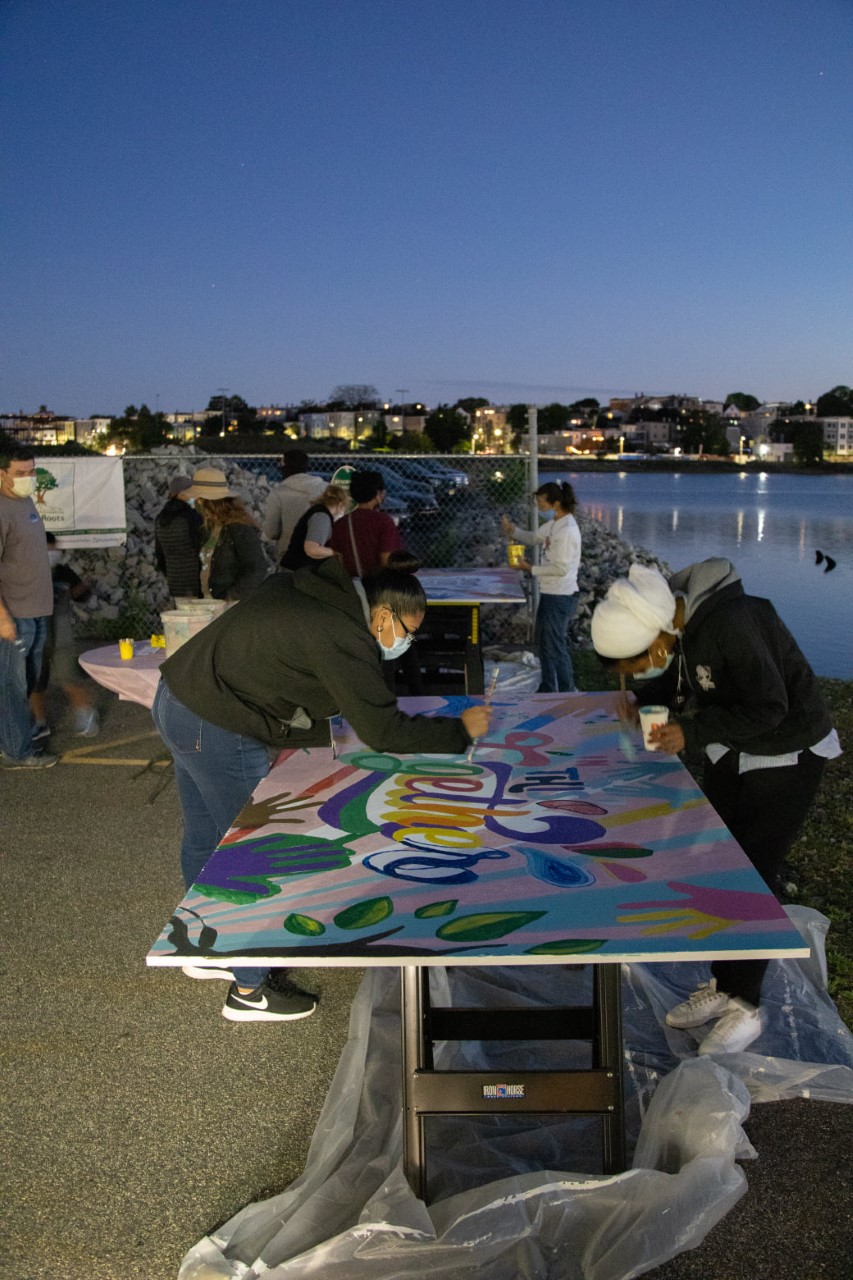 The pandemic has had a large impact on all of our grantees. What are the biggest challenges facing GreenRoots going forward?
The pandemic has had a large impact on all of our grantees. What are the biggest challenges facing GreenRoots going forward?
The most concerning impact is the lasting affect COVID-19 will have on our community. Chelsea and East Boston, the two communities in which GreenRoots organizes, have been hardest hit by the pandemic. Our neighbors are falling ill and dying at an unprecedented level. During the first peak of the pandemic, Chelsea’s infection rate was six times the state’s rate, which even exceeded some of New York City’s hardest-hit boroughs. East Boston was not far behind. Our people are essential workers, many of whom rely on public transportation and do not have the luxury of working from home. As hours have been reduced, so have salaries. In this very moment, our friends and neighbors are standing in blocks-long lines waiting for food. They are seeking help and support to avoid eviction and homelessness, trying their best to stay healthy and to care for other loved ones.
Like many other organizations, we have pivoted our focus to address the crisis and help our community. We helped found the One Chelsea Fund, which raised and distributed over $1.3 million in cash assistance to Chelsea families. One of the other founding organizations is La Colaborativa, another TPC grantee. We also helped establish and staff Chelsea’s Emergency Food Hub and established neighborhood wellness groups and pods to ensure that everyone in the city has the information, resources, and networks to get help.
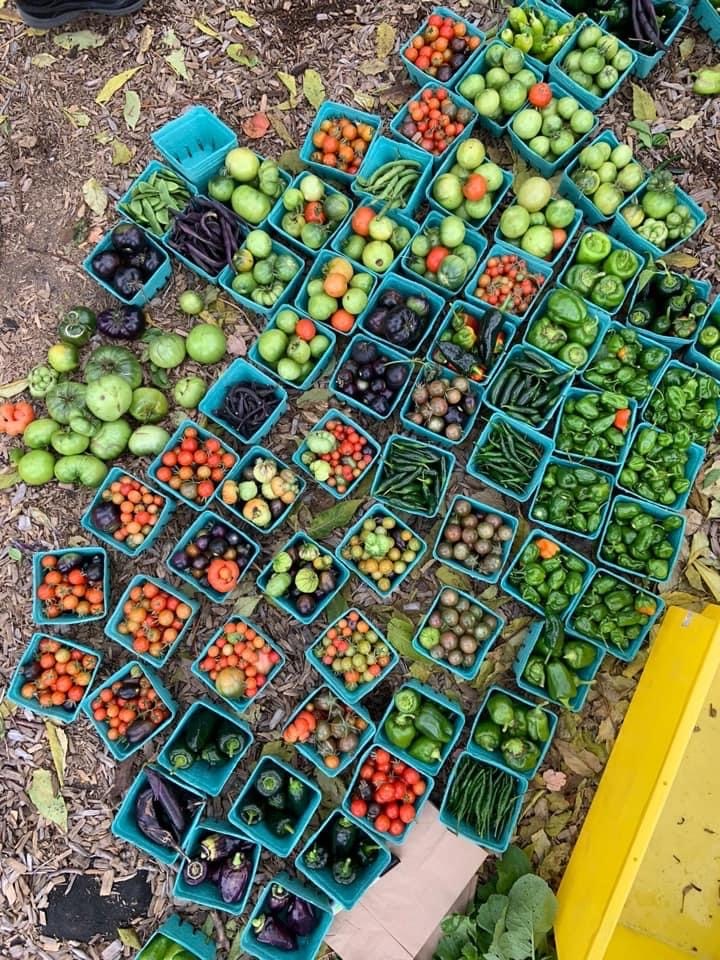 It was no coincidence that communities like ours have been hit hardest by COVID. Systemic oppression leads to black, brown, and immigrant communities being disproportionately impacted. It is this very oppression that GreenRoots works to dismantle. The challenges we all face include dismantling environmental and systemic racism; stopping new toxic facilities from being located in our communities; addressing food insecurity; achieving land sovereignty; making businesses and decision-makers accountable; addressing the very real climate threats facing our neighborhoods; working to make our cities healthy, greener, and more just; and implementing models of community resilience and sustainability. We will continue this work as we address the immediacy of the economic, health, and emotional impacts of COVID on our communities.
It was no coincidence that communities like ours have been hit hardest by COVID. Systemic oppression leads to black, brown, and immigrant communities being disproportionately impacted. It is this very oppression that GreenRoots works to dismantle. The challenges we all face include dismantling environmental and systemic racism; stopping new toxic facilities from being located in our communities; addressing food insecurity; achieving land sovereignty; making businesses and decision-makers accountable; addressing the very real climate threats facing our neighborhoods; working to make our cities healthy, greener, and more just; and implementing models of community resilience and sustainability. We will continue this work as we address the immediacy of the economic, health, and emotional impacts of COVID on our communities.
What have been some unexpected highlights of 2020?
The past nine months have been the most challenging I have ever experienced – far harder than gestation! But we’ve given birth to a collective response where everyone in Chelsea is coming together to address the needs of our community. What GreenRoots started on March 11th of last year, as a handful of stakeholders meeting to prepare and plan for our coordinated response, became more than 65 days of daily calls, more than 75 stakeholders, and 10 working groups. This collective effort led to the creation of dozens of pop-up food pantries and thousands of food deliveries; the One Chelsea Fund; multilingual messaging; a neighborhood wellness network; a funeral fund; diaper donations; emergency housing assistance; and so much more. Everyone from elected officials, to community-based organizations, health institutions, the schools, faith-based leaders, businesses, and many others came together – putting egos and politics aside – to prioritize the community.
Chelsea has experienced chaos, devastation, and pain in the past. Rather than feel victimized, we rise up together, like a phoenix from the ashes, and exert our resilience. This is what makes me grateful, humbled, and hopeful as we begin 2021 and look forward.
How has TPC’s grant helped to carry your mission forward? What else can our members do?
TPC helped GreenRoots launch a new program to expand our food justice and youth engagement work. With TPC’s funding, GreenRoots began a new Youth Urban Farm Crew that employs and engages young adults (ages 18-25) to work at GreenRoots’ Urban Farm from spring to fall. Our strategy was twofold: 1) to provide older youth with an opportunity to be more meaningfully engaged in Chelsea’s urban environment and our efforts to reclaim our air, land, and water; and 2) to build a pipeline of community growers and farmers.
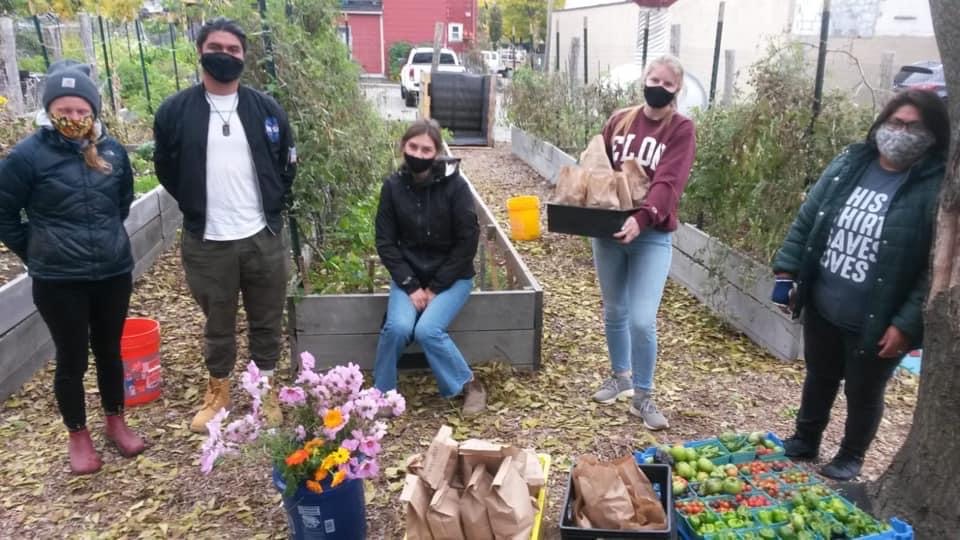 In order for our community to gain land sovereignty and address food insecurity, we need to know how to grow our own food on limited available land. Imparting knowledge and skills across our community is the only way we will achieve these goals. This program is an opportunity for residents in Chelsea, who originate from all over the world, to share their growing and farming knowledge with each other, especially younger generations. In order to sustain what we have grown, through five growing spaces, we need to ensure there are generations of community members to keep this work going and expanding.
In order for our community to gain land sovereignty and address food insecurity, we need to know how to grow our own food on limited available land. Imparting knowledge and skills across our community is the only way we will achieve these goals. This program is an opportunity for residents in Chelsea, who originate from all over the world, to share their growing and farming knowledge with each other, especially younger generations. In order to sustain what we have grown, through five growing spaces, we need to ensure there are generations of community members to keep this work going and expanding.
We’re so grateful that TPC’s funding helped us launch the inaugural year of the Urban Farm Crew. Our TPC ambassadors have also been helpful, supportive, and engaged. It has been a wonderful opportunity to connect with these women and such a committed circle of giving. We are deeply appreciative of being welcomed into the TPC family.
Learn more about GreenRoots’ impactful work in the GreenRoots Year in Review.
